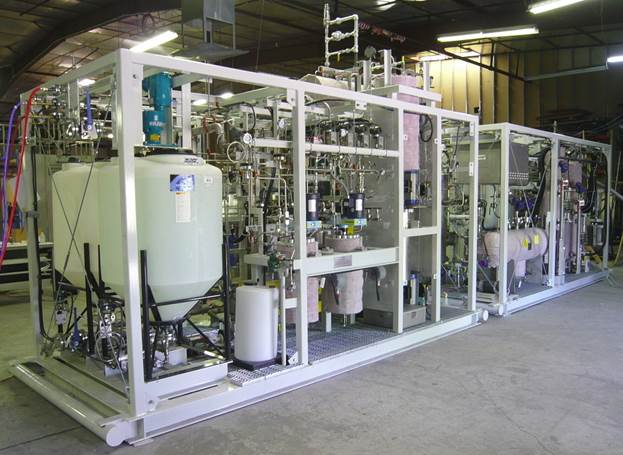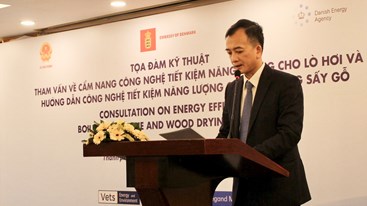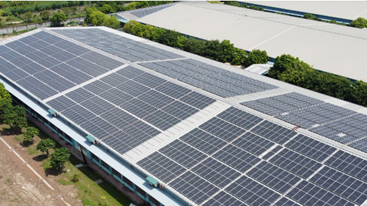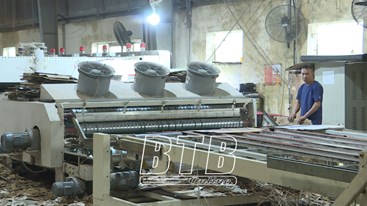Friday, 17/05/2024 | 10:31 GMT+7
The Spanish Kurata Systems business group, led by the Torres family, has launched a new industrial plant in Barajas de Melo (Cuenca), which converts waste from refinery, industrial oil and plastic into fuel oil through a process of treatment, gasification and molecular transformation. All is based on research that the company has been carrying out since 2012.
This new technology, developed in Spain, is based on previous research of Nihon Institute of Quantum Waves of Kobe (Japan). The biofuel plant located in the municipality of Barajas de Melo intends to triple the infrastructure production capacity, over the next year in order to “continue to invest in this land” and make it the “cradle” of the environmental vanguard, as declared by President Kurata Systems, Juan Torres.

Local Waste
This new system of recycling and production will promote a new energy management model based on the local waste treatment, which provides important benefits both environmental and economic. As highlighted by Julio Torres, CEO of Kurata Systems, “the plant helps reduce the problem of generation of waste that is difficult to eliminate turning it into a highly demanded product such as diesel fuel used for heating.”
Kurata representative stressed that “until now, to produce diesel we only had the option of refining oil; now, thanks to our technology, we can produce it from industrial waste and plastics. “
In the case of industrial oils, the possibility of turning them into gasoil is especially profitable and beneficial to the environment because the technologies available to date were only capable of recycling oil to make new oil.
With Kurata technology, industrial oil becomes diesel, which is a different product, much more expensive and whose production has a greater environmental impact. Thus, as emphasized by Julio Torres “the possibility of producing fuel oil from waste will contribute on the medium and long term to reduce our dependence on oil as the sole source of fuel production.”
Also, the new technology will enable to convert petroleum coke, the densest part of the oil that, at present, cannot be refined.
Plant characteristics
The Barajas de Melo plant is a new model of industrial architectural design which represents an investment of 30 million euro and will provide about 90 jobs among direct and indirect. It will produce 30,000 tons of fuel oil annually, a figure that would meet the consumption needs for 30 major hospitals of the Community of Madrid.
The Kurata technology, developed entirely in Spain is based on previous work of the Nihon Institute of Quantum Waves of Kobe (Japan), whose rights for the entire world were acquired by Kurata Systems in 2012.
Presence of the Minister of Industry
The opening of the new plant was attended by the Minister of Industry, Energy and Tourism, José Manuel Soria and the president of the regional government of Castilla-La Mancha, Maria Dolores Cospedal, as well as other authorities and investors.
Industry Minister Jose Manuel Soria, has used his visit to the plant to assure that one of the objectives of the national government is to “promote increased industry in the Spanish economy”, as he lamented, “for the past 15 years this weight has been falling gradually.” He also argued that in this sector employment “is more stable, there is more innovation, it is an exporter and has a clearly positive impact on the balance of payments,” so he has highlighted its “importance” in the economy
“It is not good let industrial activity fall. Spain is a country where tourism is the first sector, which over the years has had an extraordinary performance, but we continue with simply unsustainable levels of employment,” he said. Finally he recalled that in Spain around 1.4 million barrels of oil are imported, so he has highlighted the importance of this biofuel.
Truong Duy








.jpg?w=367&h=206&mode=crop) Energy efficiency and conservation usage is an important aspect of the national energy development strategy
05/03/2024
Energy efficiency and conservation usage is an important aspect of the national energy development strategy
05/03/2024
 Challenges and Opportunities to promote energy efficiency market in Vietnam
Challenges and Opportunities to promote energy efficiency market in Vietnam
 The Ministry of Industry and Trade requests government agencies to coordinate in organizing Earth Hour 2024
The Ministry of Industry and Trade requests government agencies to coordinate in organizing Earth Hour 2024
 Consultation on Energy Efficiency Boiler Catalogue and Wood Drying Guideline
Consultation on Energy Efficiency Boiler Catalogue and Wood Drying Guideline
.png?w=367&h=206&mode=crop) Request for expression of interest - C2.1.13: Capacity Building on energy efficiency policies development
Request for expression of interest - C2.1.13: Capacity Building on energy efficiency policies development
 Son Ha Co., Ltd, applies energy efficiency and conservation measures
Son Ha Co., Ltd, applies energy efficiency and conservation measures
 Phuc Kien Co., Ltd., is effectively implementing energy-saving measures
Phuc Kien Co., Ltd., is effectively implementing energy-saving measures
 Request for expression of interest - C2.1.12: Independent monitoring of safeguards implementation
Request for expression of interest - C2.1.12: Independent monitoring of safeguards implementation